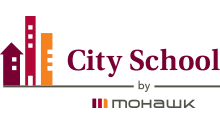Learnings from Mohawk College’s Challenge 2025 Initiative
This toolkit comprises fundamental theories and resources that helped inform and inspire the work of Challenge 2025. Explore this toolkit through the following themes:
What is Challenge 2025?
Challenge 2025 is a workforce-recovery initiative that commits intensified Mohawk College resources as backbone support to address poverty, social exclusion, and labour shortages in the Greater Hamilton Area. Challenge 2025 has been developed and administered by Mohawk College employees, with oversight by a stewardship committee of community leaders, representatives and residents. Building on the existing success of City School by Mohawk and the understanding that education and training can lead to individual and family well-being, generational change and community prosperity, Challenge 2025 works with a wide range of community partners to build a catalyst for workforce reengagement. View our Economic Impact of City School (April 2020) and Challenge 2025 (July 2020) publications.
Understanding Collective Impact
![]()
What is Collective Impact?
Collective Impact is a structured commitment between community partners from different levels of government, non-profit and private sector organizations who are invested in creating community change. Collective Impact strategies create places for Intersectoral partners to come together to solve problems in meaningful ways through systems change, resulting in sustainable impacts for the community.
Explore more
Collective Impact Forum
The Value of Backbone Organizations in Collective Impact
Tamarack Institute
Planning Your Backbone Support
Collective Impact of Challenge 2025
For a Collective Impact strategy to gain momentum, there needs to be an organization who has the infrastructure to commit dedicated human resources and backbone support to organize and mobilize partners involved in collective impact. For Challenge 2025, Mohawk College provided backbone support for the initiative through the Secretariat, a dedicated staff team with expertise in partnership building, project management and administrative communication. The Secretariat was also able to leverage Mohawk College resources to access marketing, financial, administrative and legal expertise.
Understanding Systems Change
![]()
What is Systems Change?
Collective Impact strategies acknowledge the complex and dynamic networks and systems that comprise and shape communities and seek to engage the various agents and stakeholders who are a part of these systems. For widespread sustainable impact, shifts have to happen in the systems themselves. It is important to recognize that change in complex, dynamic systems cannot be imposed or forced; however, by understanding points of alignment, leverage, and opportunity, change agents can work together to influence change. This change requires transparent and reflective conversations across various Intersectoral partners who are willing to explore their role in existing systems and be open to creating change.
Explore more
Moving from Vision to Implementation: Strategies for Systems Change in Collective Impact
Thinking Like a System and Leading with Humility
Shared Measurement
Systems Change of Challenge 2025
Members of the Mohawk College City School team spent time to understand the Ontario Works (OW) income support program policies and procedures with key local OW staff members, with the goal of identifying service gaps, intersections, and opportunities to build efficiencies and better serve shared participants through collaboration. Through this shared learning we came to better understand our respective systems’ parameters and limitations, and developed a shared language to support staff on both teams in the referral and support process.
Building a Network
![]()
To support systems change, the network of a collective impact strategy needs to be comprised of the following:
- Members of the community whom the systems change will impact (including service recipients and those with lived experience);
- Service providers and organizations who understand the needs of the community; and,
- Decision makers and leaders from organizations who have access to resources and the authority to make a change in policy or practice.
Continuous work must be undertaken to ensure network members are engaged in meaningful ways and that there are ongoing efforts to ensure fulsome representation of populations, organizations, and sectors and systems impacted.
Explore more
How to Partner for Impact: The Nuts and Bolts of Aligning Collective Impact Efforts
Turf, Trust, Co-Creation & Collective Impact
Stakeholder Engagement Wheel
Network Mapping
The Challenge 2025 Network
The Challenge 2025 Stewardship table consists of various levels of municipal and provincial government, local non-profit organizations and human service providers, industry/sector representatives and private enterprises, and persons with lived experience (i.e., persons who have experienced un- or under-employment and/or poverty). In the Hamilton context it has been important to have an awareness of other existing tables discussing education and employment in the city and to not duplicate those conversations but instead for Challenge 2025 to serve as a larger hub with a focus on strategic conversations supporting systems change.
Building Community
![]()
Building community leads to a deepened understanding of shared goals and creates cohesion among the priorities and activities of the initiative to ensure they align with that of the community it serves. Building relationships requires dedicated efforts of the backbone support team to facilitate conversations and engagement and to build interest by ensuring stakeholders feel they are represented in the work of the collective impact and systems change initiative.
Explore more
Empathy Map
How to Lead Collective Impact Working Groups: A Comprehensive Toolkit
Bringing an Equity Lens to Collective Impact
Collaborative Leadership
The Challenge 2025 Community
As the Challenge 2025 initiative has evolved there has been a great interest in Equity, Diversity and Inclusion (EDI) among all members. In response, the Secretariat has taken steps to support EDI awareness-raising activities. It is important to align activities with the interests of the Stewardship to build community amongst members. Critically, these activities must be done in a genuine and not token way. Opportunities for shared leadership, open discussion and authentic engagement with the collective must be created to build community among those involved in the initiative.
Looking Ahead
![]()
As Challenge 2025 enters the 2022-2023 fiscal year, the initiative is moving towards a more decentralized and shared leadership model. Although Mohawk College will continue to provide backbone support to the initiative, other community partners must take on leadership at this time. As we move to decentralize leadership, two organizations -- one representing the interests of employers and the other representing the interests of job seekers and employees -- will take on greater responsibility for action group facilitation and activities. Mohawk College bridges the gap between the needs of these two groups but acknowledges the expertise of those regularly working directly with target stakeholders to be of great benefit to the initiative. Shared leadership will also ensure the project’s sustainability and that the project can be flexible to changes in the local context, including the needs of employers and the workforce of the Hamilton community. Through the support of Social Impact Advisors, the Secretariat has engaged key community partners in taking on these leadership roles. The shared leadership of Challenge 2025 will take on a new governance structure in the years ahead.
Explore more
Learnings From 10 years of Collective Impact
Sustaining Collective Impact
Evaluating Systems Change
Thank you to Social Impact Advisors and Deloitte Canada for their continued support on this initiative, along with a special thanks to the Ontario Ministry of Labour, Immigration, Training and Skills Development for ongoing guidance.
This project is funded in part by the Government of Canada and the Government of Ontario.






